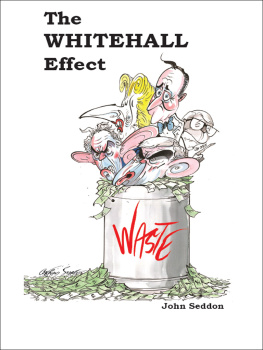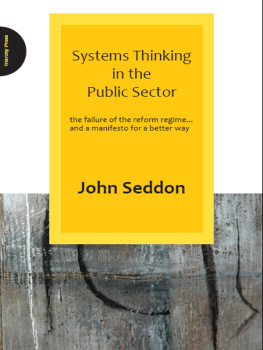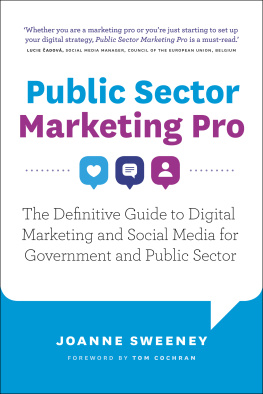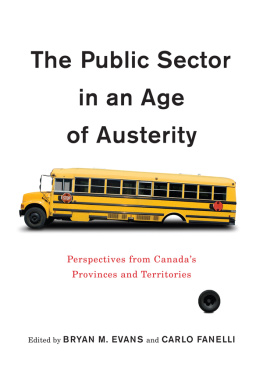Published in this first edition in 2014 by:
Triarchy Press
Station Offices
Axminster
Devon
EX13 5PF
England
+44 (0)1297 631456
www.triarchypress.net
Copyright John Seddon, 2014
The right of John Seddon to be identified as the author of this book has been asserted by him under the Copyright, Designs and Patents Act, 1988.
All rights reserved.
No part of this publication may be reproduced, stored in a retrieval system or transmitted in any form or by any means including photocopying, electronic, mechanical, recording or otherwise, without the prior written permission of the publisher.
A catalogue record for this book is available from the British Library.
Cover illustration by Gerald Scarfe
Casebound ISBN: 978-1-909470-45-3
Paperback ISBN: 978-1-909470-47-7
Epub: 978-1-909470-48-4
By Lord Victor O. Adebowale, CBE, MA
CEO, Turning Point, Health and social care Chair, Collaborate
It has been accepted for far too long, in the face of clear evidence to the contrary, that the machine age is a good thing in and of itself, and that applying the principles of efficient factory management to human-facing public services is also a good thing.
The truths set out eloquently and with ample evidence and anecdote
in this book clearly show that public services dont work that way. (I prefer to call them services-to-the-public, because its not about who provides them, its about the value such services bring to the lives of individuals and communities we all hold dear.) The book shows that the top-down design and organisation of services-to-the-public doesnt work. It also shows that the wholesale transfer of systems designed for running factories (including outsourcing and separate back- and front-offices) to services that deal with human beings doesnt work either.
John Seddons simple exposition of the different motivations of front-office, customer-facing operations as opposed to back-office, administrative processes exposes the obvious fallacy in the assumption that this is the best way of organising services designed to meet human needs. The example he gives of Swale Borough Councils housing benefits department clearly highlights the size of the problem and the scale of the opportunity.
This isnt John Seddons first foray into the world of public service design and delivery. His book Freedom from Command and Control was a manifesto for just doing things better that spoke clearly of the waste of human potential caused by bureaucracies more interested in power and position than in the value and values that actually make a difference to the customer of any service public or private.
Now, in The Whitehall Effect, he takes a clear-eyed view of the causes of the disease that I have talked about time and time again in my descriptions of too many services-to-the-public: that disease is failure demand. Behind the idea of a crisis in our public services caused by mounting demand is the reality that the crisis is not generated by demanding customers but by the failure of services to deal effectively with the customer first time round. This creates the need for more contacts, more explanation and more activity all forms of failure demand that are of negative value to the customer, the service and certainly the tax payer.
What becomes clear throughout this book is that our services-tothe-public need redesigning not cutting and that they simply cannot be redesigned without a deep understanding of the citizen/customer at the heart of the design process. Seddon sets out what this means in practice and invites service providers to ask some simple questions of the service experience to take a walk in the shoes of the user of their service. I have done this on many occasions and often shocked myself at the massive difference between the intention of the service and the actual effect it has on the lives of individuals, both customers and employees. Just as shocking is the waste of talent, ideas and experience that failure demand generates at huge cost to the public purse.
It doesnt have to be this way and in this book Seddon sets out the principles and practice of how public services could empower citizens, could be exciting (yes exciting) to deliver and could genuinely add value to the lives of the public who pay for them. Seddon makes the clear distinction between thinking that you know and actually knowing, by taking the trouble to engage with the experience of the customer.
I happened to have listened to the interview with the BBCs Peter Day that Seddon refers to in into. In fact there are many consultancies that will help you with the best of intentions design the trap, step into it and turn the screw in complete ignorance of the fact that, if you want to improve services, focusing on cost simply increases your costs. The volume trap is even easier to fall into and its worth taking a paragraph from the book that makes my point for me:
Payment for volume of activity is a common and fundamental error in outsourcing contracts. It incentivises increased activity, the last thing that is wanted in any service, least of all one that consumes public funds. It doesnt take a genius to work out that under a volume-based contract, the more failure demand the system generates, the better it is for the outsource provider. The worse the service from the customers point of view, the greater the benefit to the providers revenues.
Enough said. I guess this brings into focus one underlying theme of this book, which is that the current paradigm is difficult to shift because so many people benefit from its failure to actually deliver. There are billions at stake, effectively tied up in doing the wrong thing. What this book sets out, in a way that will make uncomfortable but necessary reading for some people in Whitehall, is that we waste money and people on what John Seddon calls pleasant dreams fantasies based on misnomers, vested interests and received wisdom instead of taking the trouble to look at what actually works, the reality of customer experience and the dangers inherent in failure demand.
~~~
John Seddons forensic eye is sobering and brings clarity and some sense of empowerment for those like myself who believe passionately in delivering better services-to-the-public.
In The Whitehall Effect he patiently presents us with the truth about what lies behind the daily frustrations, denial of service and sheer waste that is too often the citizens experience of public services. He gives us a clear technical understanding of the issues and addresses head-on the question of leadership and the work that needs to be done by those who decide the shape of those services on behalf of us all.
Most truths that I have come across tend to have the look of the obvious about them and this book contains truths that many, like me, will find self-evident.
~~~
The Whitehall Effect could not have been published at a better time. As I write, we are seven months away from a general election in which the economy will loom large as the dark cloud under which the next administration will have to work. More austerity, more cuts, the search for more for less much less will be the challenge Whitehall will face. In terms of cutting costs and reducing expenditure, the low hanging fruit have already been picked (though not necessarily in the right way) and we are now into cutting into the tree itself. At such a time, doing what we have always done will simply generate more of the same results: more failure demand, increasing costs, decreasing value and vested interests silent about the truth of all this.













